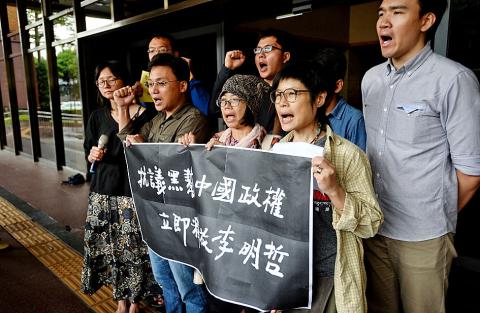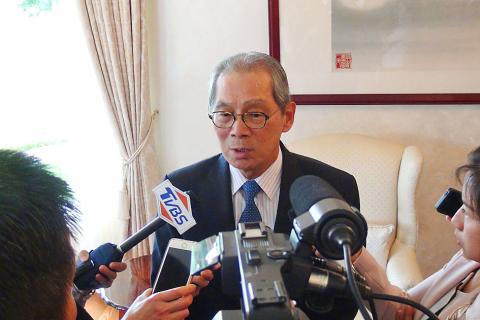Beijing late on Friday announced that Taiwanese human rights advocate Lee Ming-che (李明哲) is being held for suspected subversion of state power.
The Ministry of Justice yesterday demanded that Beijing inform Taipei of Lee’s condition based on a cross-strait agreement to combat crime and cooperate on legal matters.
After the Chinese Ministry of State Security announced that Lee had been arrested, the justice ministry said it sent an e-mail to the Chinese Supreme People’s Procuratorate demanding that Lee’s physical health, security and litigation rights be protected during the investigation.

Photo: Lin Cheng-kung, Taipei Times
It said it also called on the Chinese authorities to allow Lee’s relatives to visit him and to release him immediately after the investigation’s completion.
The Straits Exchange Foundation yesterday also called on Chinese authorities to release evidence related to the case.
The foundation said it would continue to provide assistance to Lee’s family and urged Beijing to protect Lee’s rights to avoid damaging cross-strait relations.

Photo: CNA
Lee on March 19 went missing after entering China from Macau and was later confirmed to have been detained by Chinese authorities.
China’s Taiwan Affairs Office spokesman An Fengshan (安峰山) said that Lee had been officially arrested on suspicion of “subversion of state power.”
Lee has been detained in Hunan Province since March 19, An said, adding that he and “his partners in crime have directly confessed that they carried out activities that threaten our national security.”
An said that an investigation found that Lee had since 2012 frequently traveled to China, and worked with Chinese to develop plans and establish an illegal ring to subvert Beijing.
Lee used to work for the Democratic Progressive Party (DPP) and is a staff member at Wenshan Community College in Taipei, as well as a volunteer at Covenant Watch, a non-governmental organization.
China had previously refused to provide details about his case, such as where he was being detained and what laws he was accused of violating.
Beijing has also refused to discuss Lee’s case with Taiwanese authorities and has ignored requests to allow Lee’s wife, Lee Ching-yu (李凈瑜), to visit him.
Lee Ching-yu and human rights groups have said that any “confessions” claimed by Beijing would likely be the result of coercion and have rejected suggestions that Lee Ming-che was involved in any activities in violation of Chinese law.
A group of Taiwanese civic groups — including the Taiwan Association for Human Rights, Covenant Watch, Taiwan Alliance to End the Death Penalty and the Judicial Reform Foundation — yesterday issued a statement calling on Beijing to grant people it arrested the right to counsel, see visitors and view documents, which are basic rights under Chinese law.
The Ministry of Justice should take action by immediately sending delegates to China to negotiate for Lee’s release and make sure that he is safe and can hire a lawyer, the groups said.
Even if Chinese authorities intervene and bar the delegates from entering China, at least the nation would have made its appeals and position on the issue clear, they added.
Judicial Reform Foundation executive secretary Hsiao Yi-ming (蕭逸民) said the charge of “subversion of state power” is a pretext commonly used by Beijing to quash dissidents, and that people charged with this crime could face life sentences in the worst-case scenario.
Noting that Lee is the first Taiwanese arrested on the charge, Hsiao said the justice ministry has an unavoidable responsibility to take action, as Lee “will not be the last Taiwanese” to receive such treatment by China.
“Subversion of state power is a felony in China and imposing such a charge on a Taiwanese shows that China’s infringement on foreign human rights advocates have become increasingly blatant,” the groups’ statement said, calling on more nations to pay close attention to China’s behavior.
Considering the timing of Beijing’s news release on Friday night ahead of the Dragon Boat Festival, Wenshan Community College principal Cheng Hsiu-chuan (鄭秀娟) questioned China’s intentions, saying that it was purposefully dodging attention as people prepare for the holidays.
Separately yesterday, Deputy Legislative Speaker Tsai Chi-chang (蔡其昌) said the “prison without trial” approach China is using only hurt the feelings of people across the Taiwan Strait and induced fear in Taiwanese visiting China.

Tropical Storm Gaemi strengthened into a typhoon at 2pm yesterday, and could make landfall in Yilan County tomorrow, the Central Weather Administration (CWA) said yesterday. The agency was scheduled to issue a sea warning at 11:30pm yesterday, and could issue a land warning later today. Gaemi was moving north-northwest at 4kph, carrying maximum sustained winds near its center of up to 118.8kph and gusts of 154.8kph. The circumference is forecast to reach eastern Taiwan tomorrow morning, with the center making landfall in Yilan County later that night before departing from the north coast, CWA weather forecaster Kuan Shin-ping (官欣平) said yesterday. Uncertainty remains and

SEA WARNING LIKELY: The storm, named Gaemi, could become a moderate typhoon on Wednesday or Thursday, with the Taipei City Government preparing for flooding A tropical depression east of the Philippines developed into a tropical storm named Gaemi at 2pm yesterday, and was moving toward eastern Taiwan, the Central Weather Administration (CWA) said. Gaemi could begin to affect Taiwan proper on Tuesday, lasting until Friday, and could develop into a moderate typhoon on Wednesday or Thursday, it said. A sea warning for Gaemi could be issued as early as Tuesday morning, it added. Gaemi, the third tropical storm in the Pacific Ocean this typhoon season, is projected to begin moving northwest today, and be closest to Taiwan on Wednesday or Thursday, the agency said. Today, there would likely

DISRUPTIONS: The high-speed rail is to operate as normal, while several airlines either canceled flights or announced early departures or late arrivals Schools and offices in 15 cities and counties are to be closed today due to Typhoon Gaemi, local governments announced last night. The 15 are: Taipei, New Taipei City, Taoyuan, Tainan, Keelung, Hsinchu and Kaohsiung, as well as Yilan, Hualien, Hsinchu, Miaoli, Chiayi, Pingtung, Penghu and Lienchiang counties. People should brace for torrential rainfall brought by the storm, with its center forecast to make landfall on the east coast between tonight and tomorrow morning, the Central Weather Administration (CWA) said. The agency issued a sea warning for the typhoon at 11:30pm on Monday, followed by a land warning at 11:30am yesterday. As of

CASUALTY: A 70-year-old woman was killed by a falling tree in Kaohsiung as the premier warned all government agencies to remain on high alert for the next 24 hours Schools and offices nationwide are to be closed for a second day today as Typhoon Gaemi crosses over the nation, bringing torrential rain and whipping winds. Gaemi was forecast to make landfall late last night. From Tuesday night, its outer band brought substantial rainfall and strong winds to the nation. As of 6:15pm last night, the typhoon’s center was 20km southeast of Hualien County, Central Weather Administration (CWA) data showed. It was moving at 19kph and had a radius of 250km. As of 3pm yesterday, one woman had died, while 58 people were injured, the Central Emergency Operation Center said. The 70-year-old